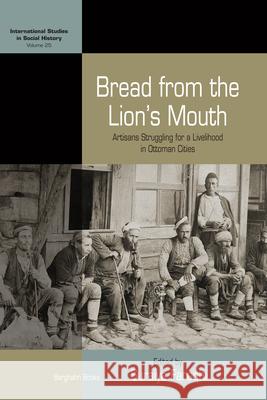Bread from the Lion's Mouth: Artisans Struggling for a Livelihood in Ottoman Cities » książka
Bread from the Lion's Mouth: Artisans Struggling for a Livelihood in Ottoman Cities
ISBN-13: 9781782385585 / Angielski / Twarda / 2015 / 366 str.
"This book is an exciting and valuable contribution to the field of Ottoman history in general, and guild studies in particular. The editor's sweeping introductory synthesis alone is an unparalleled round-up of the latest research...this introduction, and the following chapters, broach most if not all the "big questions" relating to the study of guilds and their history." - Pascale Ghazaleh, The American University in Cairo The newly awakened interest in the lives of craftspeople in Turkey is highlighted in this collection, which uses archival documents to follow Ottoman artisans from the late 15th century to the beginning of the 20th. The authors examine historical changes in the lives of artisans, focusing on the craft organizations (or guilds) that underwent substantial changes over the centuries. The guilds transformed and eventually dissolved as they were increasingly co-opted by modernization and state-building projects, and by the movement of manufacturing to the countryside. In consequence by the 20th century, many artisans had to confront the forces of capitalism and world trade without significant protection, just as the Ottoman Empire was itself in the process of dissolution. Suraiya Faroqhi is Professor in the Department of History at Istanbul Bilgi University. She has taught at Middle East Technical University, Ankara (1972-87) and served as a professor of Ottoman Studies at the Ludwig Maximilians Universitat in Munich, Germany (1988-2007).
"This book is an exciting and valuable contribution to the field of Ottoman history in general, and guild studies in particular. The editors sweeping introductory synthesis alone is an unparalleled round-up of the latest research...this introduction, and the following chapters, broach most if not all the "big questions" relating to the study of guilds and their history." · Pascale Ghazaleh, The American University in CairoThe newly awakened interest in the lives of craftspeople in Turkey is highlighted in this collection, which uses archival documents to follow Ottoman artisans from the late 15th century to the beginning of the 20th. The authors examine historical changes in the lives of artisans, focusing on the craft organizations (or guilds) that underwent substantial changes over the centuries. The guilds transformed and eventually dissolved as they were increasingly co-opted by modernization and state-building projects, and by the movement of manufacturing to the countryside. In consequence by the 20th century, many artisans had to confront the forces of capitalism and world trade without significant protection, just as the Ottoman Empire was itself in the process of dissolution.Suraiya Faroqhi is Professor in the Department of History at Istanbul Bilgi University. She has taught at Middle East Technical University, Ankara (1972-87) and served as a professor of Ottoman Studies at the Ludwig Maximilians Universität in Munich, Germany (1988-2007).











